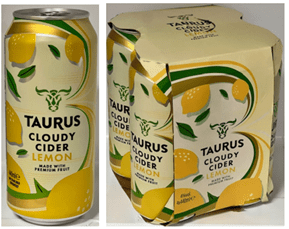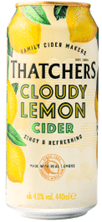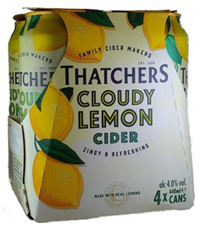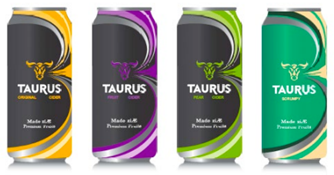Having lost to M&S in a case about a snow globe light-up gin (more here), Aldi has successfully defended another lookalike case, this time involving cider. The M&S case was based on design rights; this one, brought by the makers of Thatchers Cider, was based on trade mark rights. There are some useful lessons for brand owners to learn from Judge Melissa Clarke's judgment (decision here).
What was this case about?
It was about the products shown below. Our EU27 friends would likely see this as an easy win for Thatchers. More so that Aldi was held to have benchmarked its get up from that of Thatchers and that it had even instructed its designers to "add lemons so that it was a hybrid of Thatchers" and Aldi's own "Taurus" range.
The words cloudy, cider and lemon are clearly descriptive in this context and the words THATCHERS and TAURUS not near enough to merit a claim. So this case was just about get up.
What determined the outcome?
The combination of the judge's findings on the two points below were key to her concluding that there was no likelihood of confusion. They were:
How Thatchers had identified Aldi's get up in its pleading
The judge concluded that the claim, as pleaded, was directed only against the overall appearance of a single Aldi can. Specifically, it did not relate to the appearance of the four-pack, which, in fact, was how the Aldi goods were presented and sold in its stores. As can be seen, the four-pack packaging partly obscured the get up of the single can design. In addition, the shelf-ready packaging (the cardboard trays in which the four-packs sit on the shelf) further obscured some of the single can get up. These were relevant context-of-use factors in the likelihood of confusion test.
The way Thatchers had protected its own get up
The registered trade mark relied upon shows the Thatcher's get up as a 2D figurative mark, as below, i.e. not specifically as applied to a can shape. The judge held there was only a low degree of similarity between that and the "Sign" (the single 3D Aldi can).
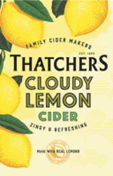
Why didn't the freeriding and dilution claims succeed?
The s5(3) claims started off promisingly enough in the judgment. The judge was persuaded that Thatchers had a reputation in its get up, as depicted, in the UK and it was not just in the word THATCHERS (as Aldi had asserted). Likewise, the necessary mental link existed, supported not least by the numerous social media posts referring to the Aldi product being a "rip off" or "knock off." However, she was not persuaded that there was unfair advantage (freeriding) or detriment (dilution or tarnishment). This was not least because of the low similarity between the 3D single can get up and the 2D registered mark.
What are the lessons from this case?
The judgment has a sub-text: had the pleadings and the registered trade mark been different, there might have been a different outcome. This allows some strategic themes for claimants to be identified:
Do not necessarily rely only on whatever registered rights you may have when the case starts
Aldi's redesign was launched in May 2022 and Thatchers issued proceedings in September 2022. If new applications had been filed between those dates for, perhaps, the 2D front of a single can and the 3D shape and get up of a single can, plus the same again for the four-packs, they might have been registered at least by the end of 2022. With the trial not until November 2023, there may have been time to add these marks to the infringement claim. This approach of tailoring the protection to the infringement was successfully taken by the claimant in PlanetArt v Photobox (2020) concerning a lookalike app icon.
Direct the claim at how the defendant is using the relevant registered marks
With this claim seemingly only addressing a single can (that was disputed), the context-of-use factors then favoured Aldi. The judge gave weight (maybe too much?) to a photo showing the Aldi four-pack on a low level supermarket shelf, showing mainly the top of the pack, which has no lemons on it and the TAURUS branding very prominent. Had the claim also been against the four-pack get up (and specifically the cardboard side of it) and if post-sale confusion had been pleaded and argued (it is not mentioned in the judgment) for the single can, it is possible the judge may have seen things differently.
Take prompt action
In particular, do not dismiss the idea of seeking a preliminary injunction too readily. It is how we resolved these sorts of cases back in the 1990s and before. There is much to be said for this approach – both cost and time-wise – since matters would usually be concluded permanently within about 2-3 months, with settlement/withdrawal soon after, depending on whether the PI was granted. It has the merit of avoiding disclosure (which almost never reveals a determinative smoking gun – noting that, in this case, the finding that Aldi had "benchmarked" Thatchers made no difference) and the risk that cross-examination of real consumers may make their evidence of actual deception/confusion (on paper) look more like mere momentary doubt (in reality).
In this case, it did not help that Aldi could produce sales figures for the new design over an extended period seemingly showing that the change of design had not really increased sales (ergo no real advantage, let alone an unfair advantage). Even more harmful is delaying generally in the face of multiple potential infringements. This can particularly undermine dilution arguments. The fact that there were multiple other Colin the Caterpillar clones around by the time M&S sued Aldi would not have helped M&S's case (which was ultimately settled, with Aldi noticeably still now selling its Cuthbert version albeit in a slightly altered form).
Dwell on the before-and-after comparison
Thatchers did rely on this, but the judge saw no "significant departure" by Aldi from its previous Taurus get up. From the comparison below that seems forensically hard to support. Such factors can weigh heavily in a case, especially on the issue of unfairness and due cause. This happened in the William Grant v Lidl (2021) case relating to a Hendrick's lookalike in which the court held there had been "a constellation of changes which simply could not have been accidental".
Beware making mere assertions of free-riding and dilution
Evidence from the brand owner on the effect of the copy branding is important to include, but it needs to go beyond the personal opinion of the witness. Whilst not addressing the specific case in point, it can often be helpful to include independent research on the impact of lookalikes generally, ideally focused on the UK market. The recent Court of Appeal decision in Lidl v Tesco contains some interesting commentary on this. The British Brands Group is particularly helpful in this regard. Their library merits a good dig around, as would an approach to their very helpful staff. The UKIPO has produced useful material on this too – see here.
Should brand owners give up policing lookalikes in the UK?
No. Some brand owners may conclude from this that the UK courts are being unduly harsh and favouring the supermarkets, at least in trade mark claims. It is true that these claims are easier to bring in some continental European countries, but they are often relying on unfair competition laws that the UK does not have. The British Brands Group and other brand owner organisations, like MARQUES, support strengthening UK laws in this area.
It would indeed be preferable to align outcomes in the UK with those in the EU. Nevertheless, the reality is that brand owners can still win these sorts of cases in the UK and should not be put off pursuing them because of this judgment. In fact, more aggression may be the answer, in particular with more preliminary injunction applications being sought.
There used to be long periods between reported decisions involving lookalikes in the UK, especially those involving supermarkets. Now they seem to come every other month. There's a fair chance we will see more shortly. It is still a realistic expectation to see the brand owners being vindicated in the right cases.
This article was first published in World Intellectual Property Review.




